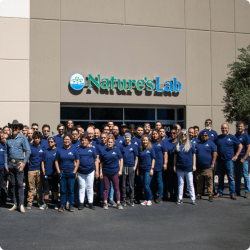

When you think about a powerful antioxidant, what comes to mind first? For most of us, it's vitamin C. It’s often the first thing we reach for when we feel sluggish or need an immune boost.
For example, when the weather begins to cool during the fall and winter seasons, many people increase their vitamin C intake – and with good reason. The list of benefits of vitamin C is impressive and numerous. We delve deeper into just how this antioxidant impacts our health.
What Does Vitamin C Do?

Vitamin C is an essential vitamin, meaning we must get it from outside sources like food or supplements since we can’t make it in our bodies. It is responsible for:
• Creating collagen
• Wound healing
• Stimulating the immune system
• Blood vessel health
• Hormone synthesis and other vital life functions
Several vitamins and minerals cannot be absorbed properly without vitamin C, including iron, vitamin B-6, and others from the B-complex family. Serotonin, a key brain neurotransmitter, relies on vitamin C and the amino acid tryptophan for its production. Even our cholesterol can be affected by vitamin C. Our bodies cannot turn cholesterol into bile acids without enough vitamin C. Having inadequate levels of vitamin C in the body may lead to higher cholesterol.*
Vitamin C and the Immune System

Vitamin C’s immune-supporting benefits are well documented,* but just how does this antioxidant rev up our immune system to fight off cold and flu bugs? There’s still much to learn about how vitamin C and our immune system interact, but research shows one possible method in which it promotes immune health.*
One study demonstrated that vitamin C helps prolong T cell viability or lifespan by blocking a chemical pathway that leads to T cell death.* T cells are one of the defenses of our immune system that keep us healthy. Our T cells are constantly created and replaced by the body; however, the longer they stay alive, the better they are for your immune system.
Types of Vitamin C
Vitamin C is chemically known as ascorbic acid, but it also comes in many other forms. Mineral-buffered vitamin C supplements such as sodium ascorbate or calcium ascorbate are less acidic than ascorbic acid. So, those with stomach sensitivities may better tolerate them.
What is Liposomal Vitamin C?

Liposomal vitamin C is a form of vitamin that is wrapped in lipids or fat. Liposomal vitamin C formulas are easily absorbed in the GI tract because this fatty layer is similar to the structure of cells.* Nature's Lab Liposomal PureWay-C® Vitamin C uses sunflower lecithin to encapsulate ascorbic acid (vitamin C). In addition to the enhanced bioavailability, the lipid layer is equivalent to a protective shell between our stomach acid and vitamin C, producing less chance of stomach upset.* Some studies show that liposomal vitamin C has better retention in the body than other forms of vitamin C.*
Vitamin C with BioFlavonoids

Research suggests that incorporating bioflavonoids, particularly those found in citrus fruits, may improve vitamin C absorption. Vitamin C and citrus bioflavonoids work harmoniously together to support blood vessel integrity– promoting healthy veins, capillaries, and overall circulation.* Vitamin C and bioflavonoids are the dynamic duos of blood vessel health. Since vitamin C helps create and maintain collagen, it supports the blood vessel structure.
Vitamin C and bioflavonoids promote healthy circulation by discouraging blood platelets from sticking together and clumping.* You can find this superhero-worthy combination in Nature's Lab Gold Super Vitamin C. It uses gentle on the stomach vitamin C in the form of calcium ascorbate along with quercetin and bioflavonoids for magnified antioxidant activity.*
Nature's Lab Vitamin C 1000 mg provides a generous dose of vitamin C in a single vegetarian capsule. Our Vitamin C Collection has options for your needs, including multivitamin formulas, liposomal vitamin C, and vitamin C with bioflavonoids
References
Pagani, A., Nai, A., Silvestri, L., Camaschella, C. (2019, October 9). Hepcidin and anemia: A tight relationship. Frontiers. Retrieved April 14, 2022, from https://www.frontiersin.org/articles/10.3389/fphys.2019.01294/full
Chambial, S., Dwivedi, S., Shukla, K. K., John, P. J., Sharma, P. (2013, October). Vitamin C in disease prevention and cure: An overview. Indian journal of clinical biochemistry : IJCB. Retrieved April 14, 2022, from https://www.ncbi.nlm.nih.gov/pmc/articles/PMC3783921/
Vitamin C. The Nutrition Source. (2021, May 27). Retrieved April 14, 2022, from https://www.hsph.harvard.edu/nutritionsource/vitamin-c/
Carr, A. C., Vissers, M. C. M. (2013, October 28). Synthetic or food-derived vitamin C--are they equally bioavailable? Nutrients. Retrieved April 14, 2022, from https://www.ncbi.nlm.nih.gov/pmc/articles/PMC3847730/







